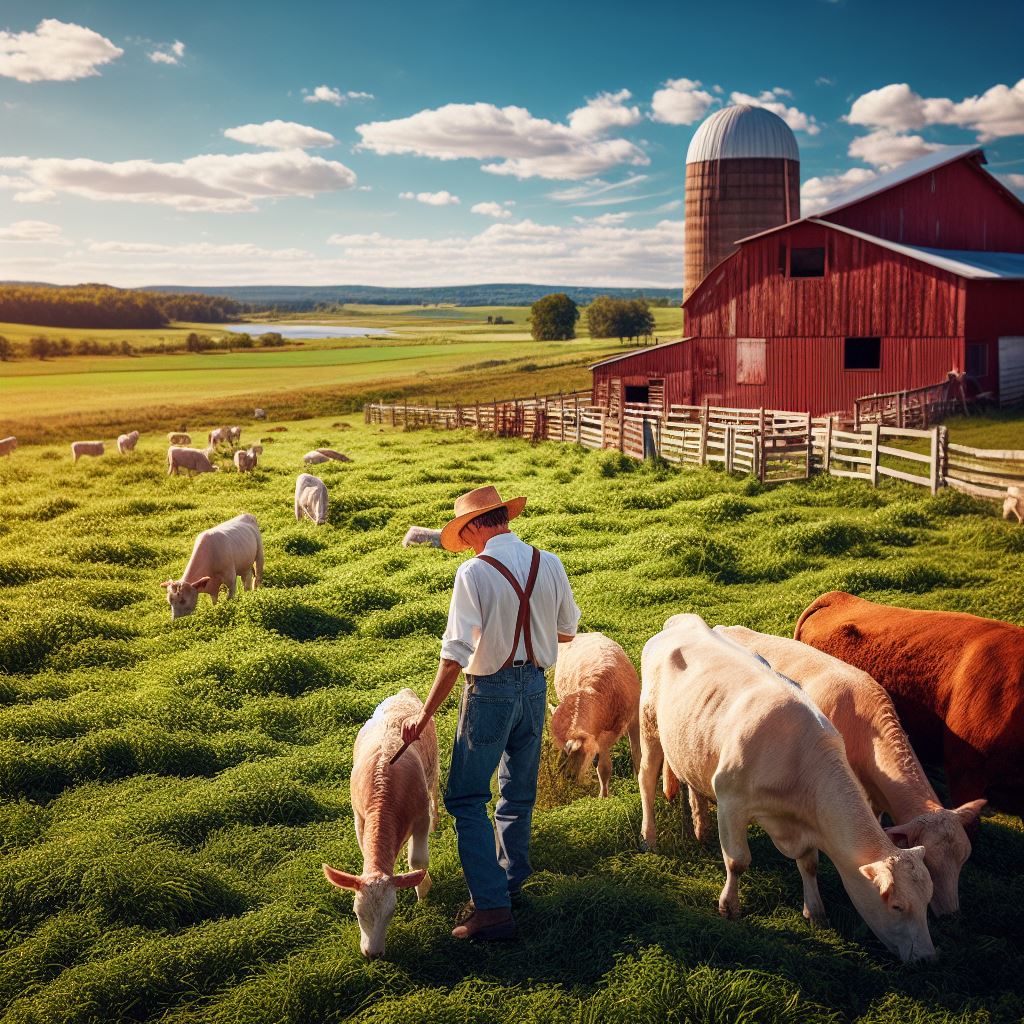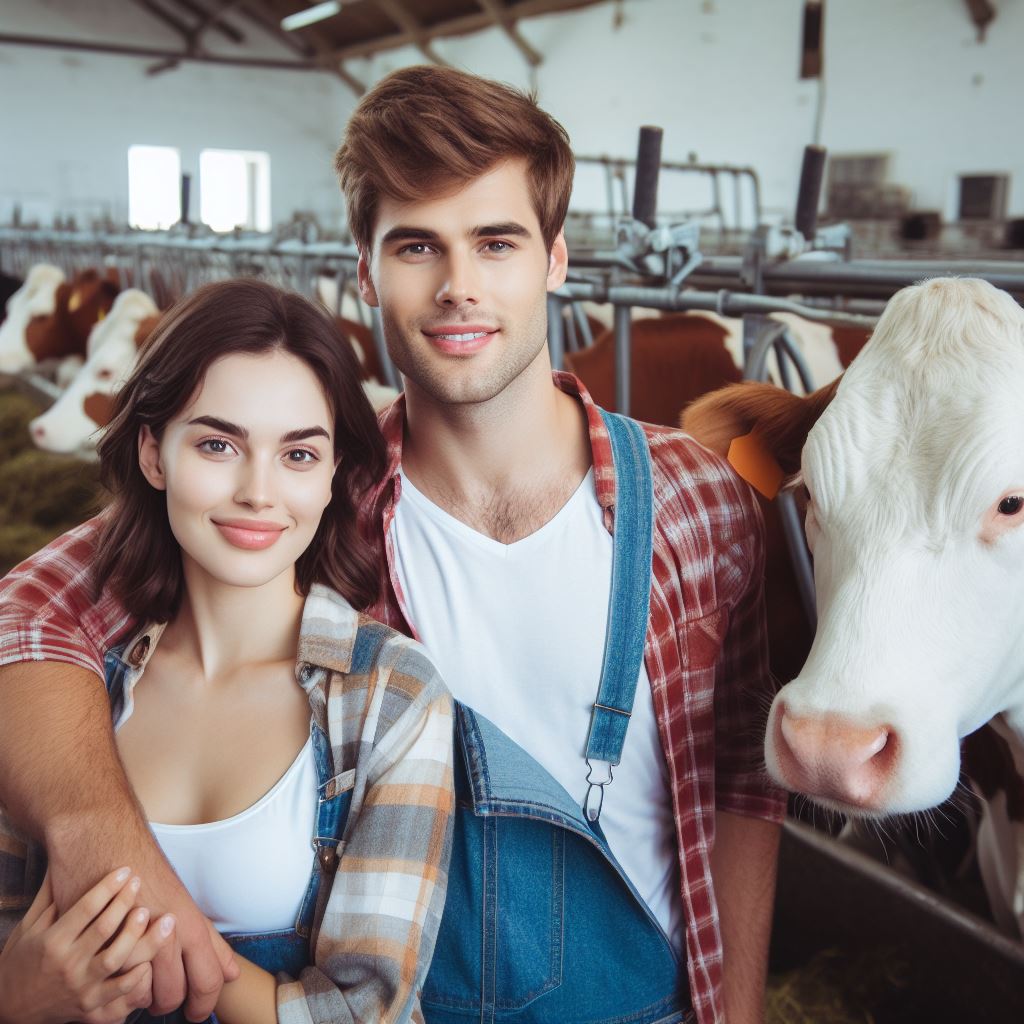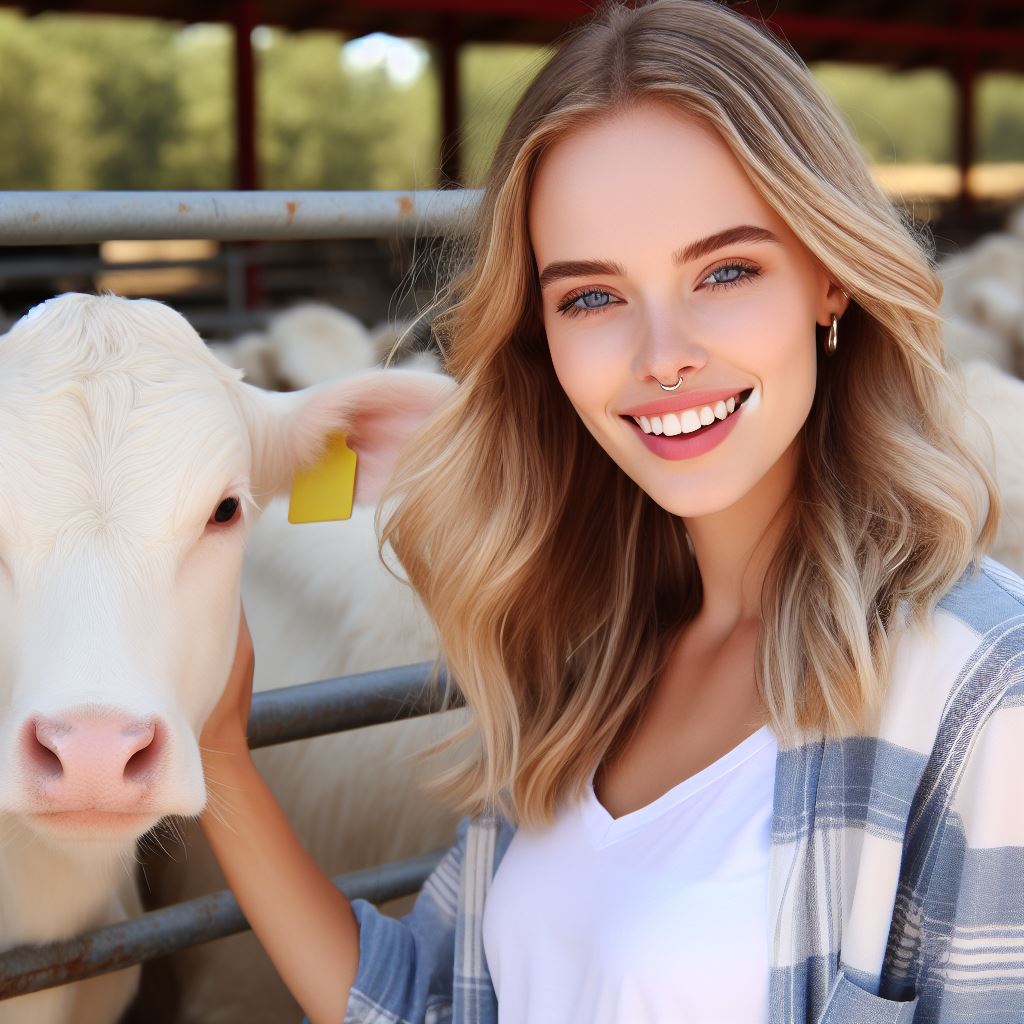Introduction to Organic Livestock Farming
Defining Organic Livestock Farming
Organic livestock farming emphasizes sustainable practices for raising animals.
This method avoids the use of synthetic chemicals and genetically modified organisms.
Instead, it focuses on natural feeding and care for the livestock.
Importance of Eco-Friendly Practices
Eco-friendly farming practices benefit the environment significantly.
They help preserve biodiversity and soil health.
Additionally, these practices reduce pollution and greenhouse gas emissions.
Transitioning to Organic Practices
Transitioning to organic livestock farming involves careful planning.
Farmers must adopt new methods for animal care and feed.
It requires commitment and education about organic regulations.
Moreover, farmers can seek certifications to validate their organic status.
The Role of Animal Welfare
Animal welfare is central to organic livestock farming.
Animals are raised in natural environments, providing better living conditions.
Farmers prioritize the physical and behavioral needs of their livestock.
Benefits of Organic Livestock Farming
Organic livestock farming offers numerous benefits.
It produces high-quality, healthier meat and dairy products.
Transform Your Agribusiness
Unlock your farm's potential with expert advice tailored to your needs. Get actionable steps that drive real results.
Get StartedConsumers increasingly seek organic options, enhancing market demand.
Furthermore, organic farms can often command higher prices for their products.
Challenges in Organic Livestock Farming
Despite its advantages, organic livestock farming has challenges.
Initial costs can be higher due to organic feed and care practices.
Farmers may also face difficulties meeting organic certification requirements.
Additionally, market access can be limited in some regions.
Benefits of Organic Livestock Farming for Sustainability
Enhancing Soil Health
Organic livestock farming significantly improves soil quality.
This practice encourages natural nutrient cycling.
It also maintains soil fertility.
Moreover, it reduces the need for synthetic fertilizers.
Promoting Biodiversity
Organic systems support diverse plant and animal species.
This biodiversity strengthens ecosystem resilience.
Additionally, it creates habitats for indigenous wildlife.
Reducing Environmental Impact
Organic livestock farming minimizes pollution from chemicals.
It lowers greenhouse gas emissions through sustainable practices.
Furthermore, this approach conserves water and energy resources.
Improving Animal Welfare
Organic livestock farming prioritizes animal well-being.
Animals receive access to outdoor spaces and natural behaviors.
Consequently, they experience reduced stress and improved health.
Supporting Local Economies
This farming method often relies on local feed sources.
It encourages farmers to engage with their communities.
As a result, local economies receive a significant boost.
Meeting Consumer Demand
Organic products are increasingly popular among consumers.
Shoppers prioritize ethical and sustainable farming practices.
Showcase Your Farming Business
Publish your professional farming services profile on our blog for a one-time fee of $200 and reach a dedicated audience of farmers and agribusiness owners.
Publish Your ProfileThus, organic livestock farming aligns with market trends.
Key Principles of Organic Livestock Management
Natural Living Conditions
Organic livestock must live in natural conditions.
They require access to outdoor spaces.
This access promotes their well-being.
Natural behaviors are essential.
These behaviors influence livestock health and happiness.
Animal Nutrition
Provide organic feed to livestock for optimal health.
The feed should come from substances grown without synthetic fertilizers.
Balanced nutrition promotes strong immune systems.
It also reduces the risk of disease.
Breeding Practices
Choose breeding methods that support genetic diversity.
Use natural breeding techniques over artificial insemination where possible.
Healthy breeding practices create resilient livestock populations.
Disease and Pest Management
Organic management focuses on prevention rather than treatment.
Utilize natural remedies and organic products for medical issues.
Regular health checks help preempt larger outbreaks of disease.
Sustainable Resource Use
Use resources sustainably to maintain ecological balance.
Renewable resources support long-term health in organic farming.
Composting and recycling reduce waste.
These actions also enhance soil quality.
Record Keeping and Compliance
Maintain detailed records for all organic practices.
Documentation supports compliance with organic certification standards.
Regular audits ensure adherence to organic farming regulations.
See Related Content: Equine Business Planning for Profitable Horse Farming Operations
Selecting the Right Breeds for Organic Farming
Understanding Breed Characteristics
Choosing the right breed is essential for success in organic farming.
Each breed has unique characteristics that affect productivity and sustainability.
For example, some breeds are more tolerant to local climate conditions.
Others may have superior health, which reduces the need for veterinary care.
Additionally, consider breeds that are known for their hardiness.
Evaluating Farm Goals
Your goals should dictate your breed selection.
Determine whether you want to focus on milk, meat, or egg production.
Different breeds excel in specific areas, so choose accordingly.
For instance, Holsteins are popular for milk production.
On the other hand, Berkshire pigs are known for quality meat.
Considering Local Adaptation
Local adaptation is crucial for breed selection.
Choosing breeds that thrive in your climate will increase success rates.
Research local breeds that have adapted well over generations.
These breeds may require less care and provide better yields.
Local knowledge can be invaluable in finding suitable options.
Researching Organic Breeding Practices
Understanding organic breeding practices is vital before proceeding.
Showcase Your Farming Business
Publish your professional farming services profile on our blog for a one-time fee of $200 and reach a dedicated audience of farmers and agribusiness owners.
Publish Your ProfileOrganic farms should source animals bred without synthetic additives.
Many farms use natural breeding methods to enhance genetics.
Look for suppliers who prioritize organic breeding standards.
Attend workshops or seminars focused on organic livestock management.
Consulting with Experts
Cultivating relationships with experts can enhance your breeding choices.
Veterinarians and livestock specialists can provide valuable insights.
Discussion with local farmers can help learn about their experiences.
Networking through farming organizations can lead to helpful resources.
Utilizing diverse sources will strengthen your decision-making process.
Delve into the Subject: The Role of Proper Vaccination Schedules in Livestock Disease Prevention
Feeding Practices in Organic Livestock Farming
Principles of Organic Feeding
Organic livestock farming emphasizes natural feeding practices.
It prioritizes animal welfare by providing wholesome diets.
Farmers focus on sourcing organic feed ingredients.
This approach enhances the nutritional quality of the livestock.
Types of Feed Used
Organic livestock eat a variety of feedstuffs.
Common choices include grains, forages, and legumes.
Farmers avoid synthetic additives and pesticides.
Organic certifications ensure feed quality and safety.
Grains
Grains serve as a staple in livestock diets.
They provide essential carbohydrates for energy.
Farmers opt for organic oats, barley, and corn.
Forages
Forages are crucial for ruminant animals.
Cows and sheep thrive on grass and clover.
Foraging encourages natural behaviors in livestock.
Legumes
Legumes are valuable for nitrogen fixation.
They improve soil health and animal nutrition.
Common legumes include alfalfa and chickpeas.
Supplemental Feeding Practices
Farmers sometimes introduce additional supplements.
These supplements enhance growth and health without chemicals.
Minerals and vitamins are common additions.
Organic farmers source these supplements responsibly.
Potential Challenges in Sourcing Feed
Finding organic feed can be challenging for farmers.
Market availability fluctuates based on demand and supply.
Transportation costs may also affect accessibility.
Effects of Sustainable Feeding on Animal Health
Organic feeding improves the overall health of livestock.
It boosts immunity and reduces disease incidence.
Healthy animals produce higher quality products.
This approach benefits both farmers and consumers alike.
Learn More: Poultry Management for Antibiotic-Free Farming
Health and Welfare Standards in Organic Livestock
Importance of Animal Welfare
Animal welfare plays a vital role in organic livestock farming.
Showcase Your Farming Business
Publish your professional farming services profile on our blog for a one-time fee of $200 and reach a dedicated audience of farmers and agribusiness owners.
Publish Your ProfileHealthy animals produce better quality products and enhance natural ecosystems.
Furthermore, high welfare standards promote ethical farming practices.
Regulations and Guidelines
Organic farming adheres to strict regulations set by certifying bodies.
These guidelines ensure humane treatment and proper care for livestock.
For instance, organizations like the USDA regulate organic certification in the U.S.
Living Conditions for Livestock
Indoor and outdoor living conditions greatly affect animal well-being.
Organic livestock must have access to outdoor spaces where feasible.
Additionally, their housing should promote comfort and safety.
Natural light and proper ventilation are essential for healthy environments.
Access to Nutrition and Health Care
Organic livestock receive high-quality, organic feed to thrive.
Nutrition impacts animal health, growth, and overall welfare.
Moreover, farmers prioritize preventive health care to maintain livestock well-being.
Regular veterinary check-ups ensure animals stay healthy and disease-free.
Behavior and Social Interaction
Animals benefit from social interactions with others of their species.
Allowing natural behaviors reduces stress and improves overall health.
For example, pigs need to root, while chickens enjoy scratching and pecking.
Enrichment and Engagement
Providing environmental enrichment fosters mental stimulation.
Simple structures, toys, and obstacles enhance livestock well-being.
Such enrichment also encourages natural behaviors essential for welfare.
Monitoring and Assessment
Farmers regularly assess animal health and welfare through observation.
Using welfare assessment tools enables farmers to identify potential issues.
This proactive approach leads to timely interventions for livestock care.
Training and Education for Farmers
Educating farmers on animal welfare is crucial for improving practices.
Workshops and courses provide valuable insights into best practices.
Farmers can share experiences and learn from each other’s successes.
Community and Consumer Support
Community support for organic livestock farming enhances welfare standards.
Consumers increasingly demand ethically sourced food products.
This market trend encourages farmers to uphold high welfare practices.
You Might Also Like: Dairy Cattle Hoof Care for Preventing Lameness Issues

Integrating Crop and Livestock Systems for Efficiency
Benefits of Integration
Integrating crop and livestock systems enhances farm efficiency.
This method utilizes resources more effectively.
Farmers can reduce waste and improve soil fertility.
Additionally, it provides diverse products for the market.
Moreover, it supports the health of the ecosystem.
Improving Soil Health
Livestock contribute to soil health through manure.
Manure acts as a natural fertilizer for crops.
Healthy soil promotes better crop yields.
Furthermore, it attracts beneficial microorganisms.
This dynamic produces a symbiotic relationship between crops and livestock.
Crop Rotation and Livestock Grazing
Crop rotation prevents pest and disease build-up.
Showcase Your Farming Business
Publish your professional farming services profile on our blog for a one-time fee of $200 and reach a dedicated audience of farmers and agribusiness owners.
Publish Your ProfileIt diversifies nutrient needs, benefiting soil quality.
Introducing livestock for grazing enhances this process.
Livestock can naturally control weed growth.
This method reduces reliance on chemical herbicides.
Economic Advantages
Integrating crops and livestock lowers production costs.
Farmers can sell both crop and animal products.
This diversification increases overall revenue.
Moreover, it allows for better risk management.
Farmers enjoy a more stable income throughout the year.
Strategies for Effective Integration
First, assess the specific needs of your farm.
Identify which crops best complement your livestock.
Next, develop a rotation plan for crops and grazing.
It is essential to monitor the health of the soil.
Additionally, farmers should adjust practices as needed.
Challenges and Solutions in Organic Livestock Production
Identifying Key Challenges
Organic livestock farming faces numerous challenges.
One major challenge is the higher production costs.
Farmers need to invest more in feed and animal care.
Market access can hinder growth for organic producers.
Consumers often struggle to find organic options in local stores.
Pest and disease management remains a significant concern.
Addressing Production Costs
Farmers can adopt innovative strategies to reduce costs.
One effective approach involves using local feed sources.
This reduces transportation costs and supports local economies.
Moreover, implementing rotational grazing can improve pasture health.
Healthy pastures lead to lower veterinary costs and better animal health.
Improving Market Access
Enhancing market access proves crucial for organic livestock success.
Direct-to-consumer sales options can boost farm profitability.
Farmers can leverage online platforms to reach broader audiences.
Establishing partnerships with local restaurants can foster demand.
Managing Pests and Diseases
Pest and disease management requires strategic planning.
Employing organic practices can effectively minimize outbreaks.
For instance, integrating beneficial insects into ecosystems can help.
Regular health monitoring ensures early detection.
Maintaining good hygiene practices in livestock housing is vital.
Implementing Sustainable Practices
Embracing sustainable farming methods enhances resilience.
Farmers might consider agroecological techniques to improve productivity.
Cover cropping practices can enhance soil fertility and moisture retention.
Such actions boost yields while preserving environmental integrity.
Investing in Education and Training
Education plays a crucial role in overcoming challenges.
Farmers should seek resources on organic best practices.
Showcase Your Farming Business
Publish your professional farming services profile on our blog for a one-time fee of $200 and reach a dedicated audience of farmers and agribusiness owners.
Publish Your ProfileParticipating in workshops and seminars can expand knowledge.
Networking with experienced organic farmers offers valuable insights.
Using online educational platforms can enhance learning opportunities.
Market Trends and Consumer Demand for Organic Meat and Dairy
Growing Interest in Organic Products
Consumer interest in organic meat and dairy products is increasing steadily.
People are becoming more aware of health and environmental benefits.
As a result, organic livestock farming is gaining traction.
Market Growth Statistics
The organic food market has seen remarkable growth in recent years.
According to recent research, the organic meat segment is growing rapidly.
In 2022, organic meat sales topped $1 billion in the United States alone.
Similarly, organic dairy products are experiencing substantial demand.
These trends indicate a shift towards more sustainable farming practices.
Consumer Preferences and Attitudes
Consumers are increasingly favoring organic options over conventional products.
Many people believe organic meat and dairy are healthier choices.
Moreover, a significant number of consumers prioritize animal welfare.
This belief drives demand for organic products from ethical sources.
Impact of Health Trends on Consumer Choices
Health trends continue to influence purchasing decisions.
Many consumers seek out organic products for perceived health benefits.
Additionally, the rise of plant-based diets has sparked interest in organic meat alternatives.
Consequently, organic livestock farming adapts to meet these evolving tastes.
Environmental Awareness and Ethical Considerations
Environmental impact plays a crucial role in consumer choices.
Organic farming practices typically have a lower carbon footprint.
Moreover, they promote biodiversity and soil health.
As a result, environmentally conscious consumers are more likely to buy organic products.
Challenges and Growth Opportunities in Organic Livestock Farming
The organic livestock farming sector faces challenges but also presents opportunities.
Supply chain issues can affect product availability and pricing.
However, growing consumer demand offers potential for growth.
Farmers can capitalize on this trend by adhering to organic standards.
Furthermore, transparent marketing can build trust with consumers.
The Future of Organic Livestock Farming
Growth Potential
Organic livestock farming is experiencing significant growth.
This sector thrives due to increasing consumer demand for sustainable products.
Farmers are responding by adopting eco-friendly practices.
Moreover, regulatory support fosters a favorable environment for growth.
Innovative Practices
Innovative strategies will shape organic livestock farming.
For instance, technology can enhance farm management.
Precision livestock farming optimizes resource use and animal welfare.
Additionally, regenerative agriculture practices improve soil health.
Challenges Facing Organic Livestock Farming
Nonetheless, challenges persist in this vibrant industry.
Pest management in organic systems remains a key concern.
Additionally, economic pressures can impact profitability.
Farmers must adapt to fluctuating market demands.
Showcase Your Farming Business
Publish your professional farming services profile on our blog for a one-time fee of $200 and reach a dedicated audience of farmers and agribusiness owners.
Publish Your ProfileEnhancing Community Engagement in Organic Farming
Engagement with local communities strengthens organic farming.
Farmers can collaborate with consumers through farm-to-table initiatives.
Moreover, educational programs can promote awareness about organic practices.
Ultimately, this connection can drive wider acceptance of organic products.
Outlook for Sustainable Growth in Organic Livestock Farming
The future of organic livestock farming looks promising.
With innovation and community support, it will continue to flourish.
This sector holds the potential to lead global sustainability efforts.
Additional Resources
Recycling Cow Manure | American Dairy Association NE
Role of organic farming for achieving sustainability in agriculture …




